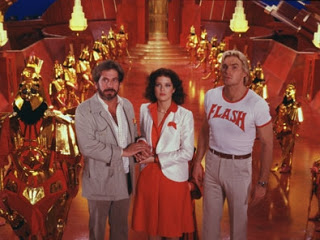Over the weekend, I watched three sci-fi films with Chris The Nuclear Kid – the very first of the original Flash Gordon serials, the 1980’s Flash Gordon, and Titan A.E.. Watching the three in such close proximity really highlighted a lot of important bits about storytelling. (This is an expansion of a comment thread on Google Plus, by the way.)
The Flash Gordon comparisons are perhaps the most obvious, since the first episode of the serial closely parallels the first twenty minutes of the movie remake. While hard to believe, the 1936 serial is actually more obvious and blatant.
I had described the format of old serials to my 14 year old, including the tendency to have cliffhangers. His comment at the end of the first episode, where Flash falls down a tunnel was: “Wow, that was… um, an actual cliffhanger.”
The serial had a lack of subtlety everywhere – every storytelling technique I’ve ever learned or been told about was (eventually) done really really blatantly. And the net effect was to counteract the technique in question – as my kiddo showed. I’m assuming – given the similar blatantness of the other pulp fiction of the day – that was acceptable at that time.
But the Flash Gordon of the 1980’s – while fun, is still campy as hell. The fun of the movie is despite the camp. It was (I presume) a serious attempt to use blatant writing hooks to keep an audience… and only the outrageousness of it kept it from being an utter failure. And that’s with the blatantness turned down.
Those blatant attempts to keep readers (or viewers) have become a joke. Literally, like in Young Frankenstein, where Frau Blucher’s name makes the horses whinny. It has nothing to do with glue – but is just Mel Brooks making fun of the ominous thunderclap (or musical sting) when the villain’s name is said.
 |
| I am totally a sucker for good ship design. |
So that brings us to Titan A.E.. Overall, it’s a pretty good space opera that could have been great. It has good use of animation mixed with CG, awesome ship design, and some great voice talent (including Matt Damon and Drew Barrymore) and a ship’s crew that has some resemblance to the personality mix that showed up two years later in Firefly. And maybe that’s why I noticed where the tone was off.
Titan A.E. gets classified under “children’s”, when it really is a YA story. It is not a comedy, but someone tried to shove comedy in it to make it a “children’s” film. We’re not talking the Jayne-like humor in lines like: “A smart guard. Who would have guessed?”, but near-pratfalls and bumbling incompetence.1 It creates unexpected and quite frankly, unpleasant shifts in tone. It really feels like like someone – a producer, perhaps – insisted on having some “cute” jokes to make it fit as a kid’s movie.
Which sucks. It was totally unnecessary – the characters are well-rounded and dynamic enough to provide enough humor to keep it from being oppressive. It’s much like the difference between C3PO and Jar-Jar – one’s a character that’s funny… and one is a funny character. I think the attempts at “kid-friendly humor” at the beginning of Titan A.E. both got it misclassified as a children’s movie (which pissed off quite a few parents) and took the whole movie down a notch.
So here’s the point: Blatant attempts to manipulate your audience will backfire. Trust your audience.
Because even if they can’t identify how they’re being manipulated, they sure can feel it… and then they’ll resent it.
1Some of that incompetence is explained as something else much later in the film… but by then, the damage is done.

